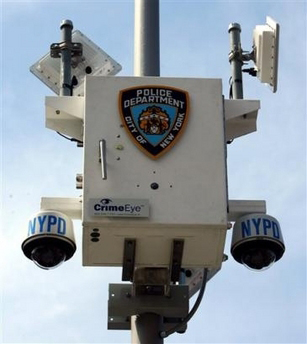
Fifty-seven new police cameras are making their way into Queens – leaving some residents relieved to have what they say are crucial crime-fighting tools and others concerned about personal liberties.
With the impending installation of 57 new police surveillance cameras throughout Queens, there is no doubt: Big Brother is watching.
But, area civic leaders, legislators and other residents seem to, for the most part, agree this is no Orwellian nightmare – though groups like the New York Civil Liberties Union and the American Civil Liberties Union have raised repeated concerns over the increased surveillance. Instead, many say they welcome the increase in cameras in public spaces.
“We have a few in the 112th Precinct, and we’re getting a whole batch more,” said 112th Precinct Community Council President Heidi Harrison Chain. “They do serve as a deterrent, and if we have images of the people committing the crimes, hopefully the images help people recognize them and help the police arrest them faster.”
Public attitudes towards surveillance cameras have grown increasingly warm over the years, with many citing the increased role footage has played in nabbing criminals in places like Forest Park or along Jamaica Avenue in Woodhaven.
An overwhelming number of New Yorkers have come out in support of police cameras, according to a poll released by Quinnipiac University in May that reported city voters support 82 to 14 percent the increased use of surveillance cameras in public spaces. Support among black and Hispanic voters is even higher than white voters, with 86 to 12 percent of black voters and 88 to 12 percent of Hispanic voters saying they back the cameras. White voters said they supported it 80 to 16 percent. Women tend to favor the cameras more than men, with 86 to 11 percent of female voters saying they back the surveillance, compared to 78 to 19 percent of their male counterparts.
Much of the support for the cameras seems to stem from concern over another terrorist attack, and 62 percent of city voters said they are “very worried” or “somewhat worried” there will be another attack in the city.
“Most New Yorkers think another terrorist attack, like the Boston Marathon bombing, is likely,” said Maurice Carroll, director of the Quinnipiac University Polling Institute. “Smile, you’re on a New York City surveillance camera, and voters would like to see more of them.”
And more of them are coming to Queens, Borough President Helen Marshall announced in late June. Marshall allocated $2 million in capital funds for 57 new surveillance cameras in the borough – including three in the 102nd Precinct, three in the 104th Precinct, and one in the 106th Precinct.
There will be cameras installed in the 102nd at 101 Avenue and 115 Street, Jamaica Avenue and 102 Street, and Woodhaven Boulevard and Jamaica Avenue. Another round of cameras will be placed in the 104th Precinct at Broadway and 75 Street, 68 Avenue and Fresh Pond Road, and Madison Street and Fresh Pond Road. In the 106th Precinct, a camera will be installed at Liberty Avenue and 80 Street.
“These new cameras will give police more eyes on the street,” Marshall said. “They will be a fantastic deterrent to crime and greatly help our police to solve crimes and apprehend offenders. After all, the camera doesn’t lie.”
The cameras are being paid for with an allocation the borough president made in the 2013 capital budget. Since that money was provided, the NYPD has been studying crime data and other information to determine where the installation of the cameras would be the most effective in fighting crime.
While there is clearly much support for the cameras, there have been concerns raised by groups like the New York Civil Liberties Union and the American Civil Liberties Union over the constant surveillance of citizens by government officials. According to the same Quinnipiac poll, the majority of the public agrees that the government should not violate basic civil liberties to prevent terrorism – though what those liberties constitute can be in dispute.
But civic leaders said they don’t believe an increase in cameras constitutes a violation of personal liberties.
“If you look at Manhattan, the entire downtown area is under surveillance and it doesn’t seem to have violated liberties,” Chain said. “But it has stopped crime and helped it become more secure. We think it’s a good thing to have additional cameras.”
By Anna Gustafson
